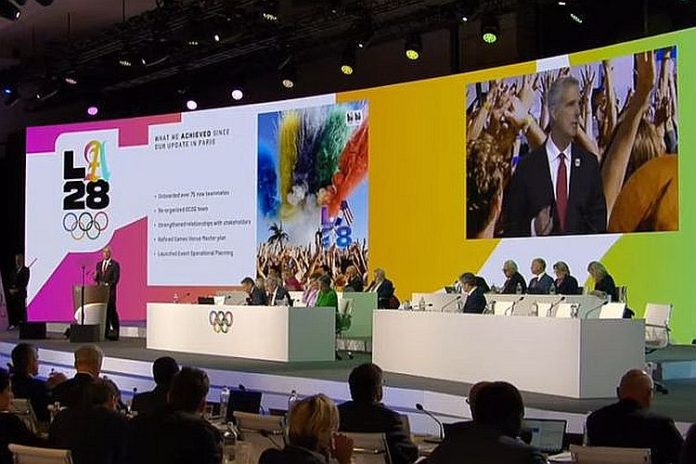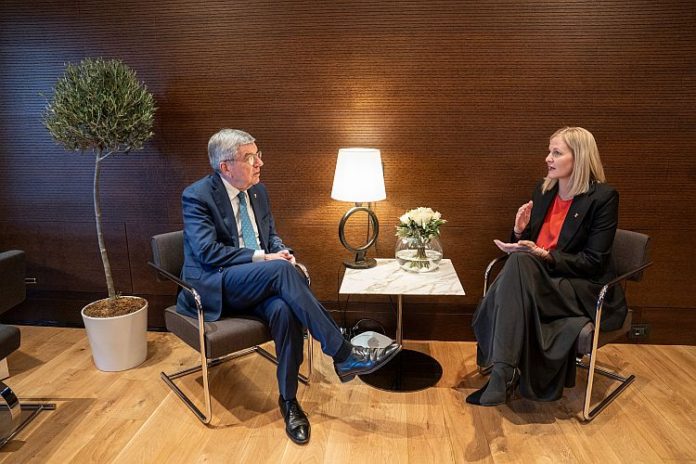★ The Sports Examiner: Chronicling the key competitive, economic and political forces shaping elite sport and the Olympic Movement.★
★ To get the daily Sports Examiner Recap by e-mail: sign up here! ★
≡ LA28 ACCELERATES ≡
While most of the attention at the 144th IOC Session in Greece focused on the election of the 10th President of the International Olympic Committee, last Thursday also included major reports from the organizing committees from 2026 through 2032.
Included in that was the LA28 review, from organizing committee senior executives Casey Wasserman (Chair), Reynold Hoover (CEO) and Olympic swimming star Janet Evans (Chief Athlete Officer), introduced by U.S. Olympic & Paralympic Committee Chair Gene Sykes.
Hoover gave a detailed presentation (more details here) and said that four areas for which information has been eagerly awaited will be provided at the online meeting of the IOC Executive Board on 9 April 2025:
● Olympic venue master plan
● Sports event program and athlete quotas
● Accommodations allocation plan
● Ticket pricing strategy
LA28 has announced many of the venues for 2028, but with a now-confirmed record total of 36 sports on the program, there are still questions on seven sports included in the Paris 2024 program:
● Cycling: Mountain Bike and Road
● Football: preliminary match sites
● Modern Pentathlon
● Shooting: one of two SoCal sites
● Sport Climbing
● Surfing: one of two SoCal sites
● Volleyball: Beach and Indoor
Also, official word is still to come on most of the added sports for 2028:
● Baseball: expected to be at Dodger Stadium
● Softball: announced for Oklahoma City
● Cricket
● Flag Football
● Lacrosse
● Squash
A letter from Hoover to the Los Angeles City Council last week stated that the 22,000-seat BMO Stadium in Exposition Park will not be used for football prelims, but for two added sports, likely Flag Football and Lacrosse 6s. This required approval from the City Council.
The ticketing component will feature 14 million or so tickets for the Olympic and Paralympic venues combined, allowing the possibility to break the record of 12.1 million established by Paris 2024.
¶
Wasserman was asked during the question period about the organizing committee’s view on dealing with traffic for the potential 14 million ticket buyers:
“For 17 days, we can fix any problem in the world. And for 17 days, we can manage traffic and movement of people in a way that you can’t every day, normally. So, whether it’s the things they did in ‘84, removing trucks from the streets, deliveries from the streets except between midnight and 5 [a.m.], obviously, creating remote work now is a very practical solution. There is tens of billions of dollars of infrastructure in terms of transportation – not for the Olympics, not related to the Olympics – but they will be done by the Olympics, will be meaningfully different than 1984.
“In 1984, we were building freeways, literally, today we’re building, I think, the second-largest metro construction project on earth. And so we are very confident in our ability to deliver, and let’s not get confused. Our venues are designed, and our city is designed, for people to drive their cars to events.
“They won’t drive them in the same quantities, at the same scale they do today, but that will also be a part of our delivery, because it would be a mistake not to take advantage of the venues that are designed and the use case they are designed for.”
So, people driving cars is definitely part of the LA28 plan, moving along with its “public transit first” concept for the last mile to the Olympic and Paralympic venues, which is already in wide use for special events of all kinds, such as the annual Rose Parade and Rose Bowl Games in Pasadena.
Wasserman referred to freeway building, which was actually not going on in 1984, but picked up later with the last new freeway to be opened, the I-105, in 1993. As for the current, giant Metro project, it’s the expansion of the D Line from mid-town to Westwood (near UCLA), the Metro A Line from Glendale to Pomona, and the LAX Automated People Mover in and out of Los Angeles International Airport, slated to open in 2026.
¶
The IOC is also on the ground with two staff members already working in Los Angeles, Pierre Ducrey (SUI), the IOC’s Olympic Games Operations Director, a 22-year veteran of the organization, and Gavin McAlpine (GBR), head of the Games Delivery Office, who worked on the Vancouver 2010 Winter Games and joined the IOC in 2017.
¶
★ Receive our exclusive, weekday TSX Recap by e-mail by clicking here.
★ Sign up a friend to receive the TSX Recap by clicking here.
★ Please consider a donation here to keep this site going.
For our updated, 895-event International Sports Calendar for 2025 and beyond, by date and by sport, click here!


























